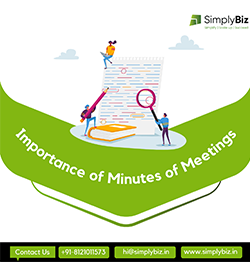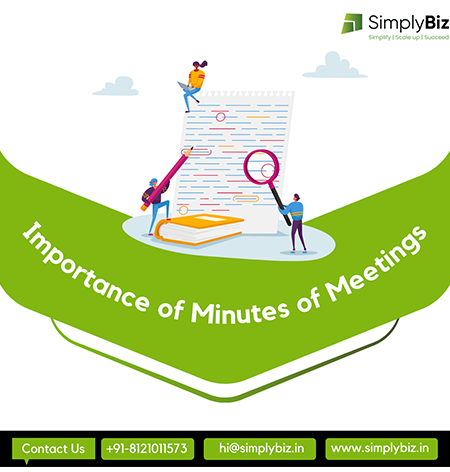Importance of Minutes of Meeting
Contributed By: P.Rithika Kumari
Email ids: rithika@simplybiz.in
Minutes of a meeting are a written record of what happened and what decisions were made during a meeting.
Minutes of the Meeting serves as written records of what occurred during a meeting, and they play a pivotal role in a company’s corporate governance regime. Despite this fact, they are often viewed as an administrative burden by management. Minutes are like the DNA of a company, containing all the data from its incorporation to closure.
Minutes of meetings are an essential part of documenting what occurs during a meeting. They are typically maintained by the corporate secretary and provide a comprehensive record of the decisions, motions, and critical discussions that take place during the meetings. Minutes should be concise, and precise, and provide a significant overview of the issues discussed and adopted, including important details such as the date, time, location, attendees, and any background materials that were distributed beforehand.

There are several reasons why maintaining proper minutes is essential, some are stated below:
- Legal and regulatory requirements: Minutes are an official record of the meeting activities and are necessary at the time of legal proceedings, audits, or regulatory reviews. They act as documentary evidence and are required to be maintained in a secure and easily accessible location. Proper minutes are considered a good governance practice that helps in promoting responsibility and fulfilling the company’s legal and regulatory obligations.
- Stakeholder confidence: Meeting minutes increase confidence in a company’s governance abilities, which in turn increases shareholders’ trust and confidence in the company. Stakeholders appreciate consistent processes and continuity of record-keeping and proper storage of records of meetings. On the other hand, inconsistent minutes may lead to questions about the company’s governance leadership. Poorly documented meeting minutes may indicate to stakeholders that the Board is not fulfilling its responsibilities in a serious and competent manner.
- Corporate governance and ESG support: Records of the company’s corporate governance activities and environmental, social, and governance (ESG) concerns are deeply concerning to investors from the current governance standpoint.
The consequences of not maintaining proper meeting minutes can be severe:
- Loss of confidence in the management of the Company
- Regulatory actions can be taken against the Company
- Investors may not want to invest in the Company
- Inadequate minutes can lead to misunderstandings and disputes among the Board members and stakeholders.
Signing and authenticating Minutes
When it comes to documenting the proceedings of a Board Meeting, there are certain guidelines that must be followed. According to the rules, the Minutes of the Meeting of the Board must be signed and dated by the Chairman of the Meeting or by the Chairman of the next Meeting. This ensures that there is an accurate record of the proceedings, and the minutes can be relied upon as evidence of the meeting.
Can minutes be maintained in loose leaf?
A company may choose to maintain its Minutes in physical or electronic form with a timestamp. However, if they are maintained in loose-leaf form, they must be bound periodically, depending on the size and volume of the minutes, and coinciding with one or more financial years of the company. Additionally, a proper locking device must be used to ensure security and proper control to prevent the removal or manipulation of loose leaves. The Minutes of the Board Meeting must be kept at the Registered Office of the company or at such other place as may be approved by the Board.
Circulation and confirmation of minutes
The draft minutes of the meeting must be circulated to all directors of the company within 15 days from the date of the conclusion of the meeting. The draft minutes can be circulated by hand, speed post, registered post, courier, e-mail, or any other recognized electronic means. This ensures that everyone has an opportunity to review and provide comments on the minutes before they are finalized.
Evidence value of minutes
Minutes serve as an evidence of the proceedings of meetings and according to section 118(8) of the Companies Act, 2013, if the minutes are kept in accordance with the provisions of section 118, then, until the contrary is proved, the meetings are deemed to have been duly called and held, and all proceedings thereat to have duly taken place, and in particular, all appointments of directors or liquidators made at the meeting are deemed to be valid.
How to write good Minutes of a Meeting
To write good Minutes of a Meeting, it is important to create an outline or use a meeting minutes template. Attendees should be checked off as they enter, and notes should be taken on action items and decisions. However, it is not necessary to write down everything that is said. Instead, it is crucial to focus on the key points and outcomes of the meeting.
During the meeting, the minutes should be put down as they are discussed. This ensures that nothing is missed, and the minutes are accurate. At the end of the meeting, the minutes should be reviewed with all attendees to ensure that everyone is in agreement with what has been recorded.
After the meeting, the notes should be revised, and any spelling errors corrected. This ensures that the final version of the minutes is accurate and professional. By following these guidelines, anyone can write good Minutes of a Meeting that are reliable and accurate records of the proceedings.
Therefore, it is essential to ensure that proper meeting minutes are maintained as they serve as a critical record of the company’s decision-making process and are essential for maintaining transparency and accountability.
SimplyCorp is a solution that offers comprehensive and end-end management of Corporate Governance & Secretarial Compliances covering all stages of entity life cycle. If want to know more on the compliance requirements and outsource the same to us, please write to our Product Head – Vaishali Vohra at the mail ID vaishali@simplybiz.in or SimplyCorp@simplyBiz.in.


Leave A Comment